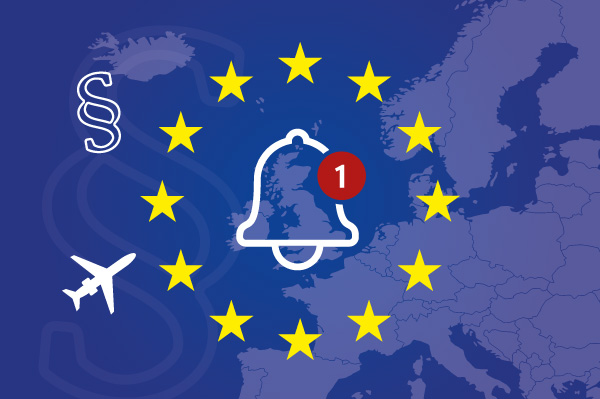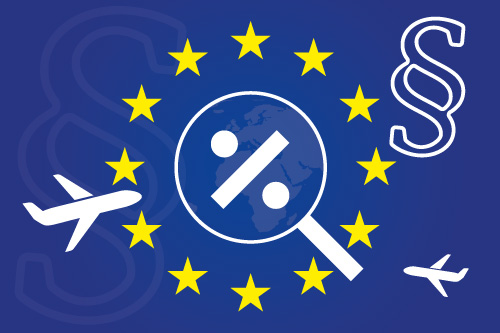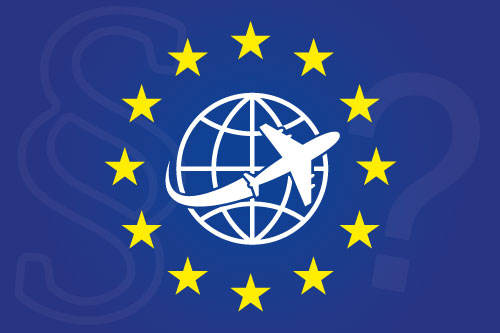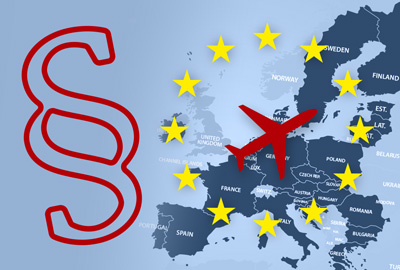WARNING: New development about a lessee’s right to deduct and defer VAT
DECEMBER 2020
- Has a lessee the right to deduct and defer VAT imposed during a full importation?
A new development has happened
![]() This article relates only to a full importation into the EU where the aircraft is not VAT-exempt as being used for commercial flights under an AOC or a charter certificate. It does not apply to the use of the Temporary Admission regulation.
This article relates only to a full importation into the EU where the aircraft is not VAT-exempt as being used for commercial flights under an AOC or a charter certificate. It does not apply to the use of the Temporary Admission regulation.
We wrote an update back in June 2017 about this issue, but for a long time, it seemed that Denmark was the only EU member state to implement the change, where a lessee is denied the right to deduct and defer VAT imposed during an importation. Unfortunately, the EU system is a slow-moving and complicated machine, meaning that all judgments and directives are not interpreted equally, and local legislation is not implemented simultaneously in all EU member states. This frequently creates much confusion, making it hard for even laypeople to determine what is right or wrong.
EU member states have started implementing the change
We are now seeing changes in various EU member states where they – as anticipated – are blocking the possibility for anybody else than the real economic owner to deduct and defer the VAT imposed during the importation. Any importer can, of course, still import an aircraft, but the VAT imposed must be paid cash and cannot be deducted and deferred. EU member states have started to alert potential stakeholders by changing their guidelines to reflect the above over the last couple of years.
A recent European Court of Justice (ECJ) judgment C-621/19 (Weindel Logistik Service) has also heavily underlined what we described back in 2017, even though the case is very different from the aircraft and the aviation business. The court order C-621/19 reconfirms the earlier principles for import cases and the related VAT-handling, backing earlier ECJ judgments and working papers that states that a lessee is not allowed to deduct and defer VAT imposed during an importation.
The judgment lays out two principle reasons why the importer cannot deduct and defer the VAT imposed during the importation, namely when 1) the importer does not have the right to dispose of goods as an owner, and 2) the cost of the imported goods does not have a direct and immediate link with the importer’s economic activity. Only an owner can meet these preconditions in an aviation context.
Why this warning?
Our concern is that we still see many importations within the EU where aircraft are imported by, e.g., a lessee with the importation VAT fully deducted and deferred, and this is indeed a dangerous path based on the above.
The Risk
It is now evident that there is considerable risk if an aircraft is imported by anyone else than the real economic owner. We are afraid that importers/operators are falling into a trap if they do not realize that the interpretations have changed and fail to follow these rule-changes in detail. Here, the risk is a penalty with a full retrospective repayment of the VAT imposed during the importation (ranging 17-27% of the aircraft’s value). We have no doubt that it is just a matter of time before the above is fully implemented in most EU member states. It is our impression that the EU Commission will do their outmost to align these rules within the EU, even if it requires legal action against any rogue member states.
Any aircraft imported must now be seen as risky, unless proper precautions are taken to secure the importation transaction, e.g., having the local VAT authorities rubberstamp the transaction by asking for a binding assessment ruling, covering all details of the case where it is approved that the importation VAT can correctly be deducted and deferred by the appointed importer of record. The VAT authorities cannot reverse a precise and specific binding assessment ruling.
Aircraft structures and importations are complicated with many rules often implemented with local twists, so nobody should import an aircraft (due to the asset’s high value) without asking for a binding assessment ruling before the physical importation. Owner structures are also complicated, often with many entities claiming to be the “owner” e.g. the registered owner, the UBO, or the entity buying or paying for the aircraft, etc. There is simply no room for misunderstandings in these cases.
The fact is
- Only the owners can import aircraft themselves and then deduct and defer the VAT imposed during the importation.
- Any other kind of entity using the aircraft, like a lessee, management company, etc., cannot import and then later deduct and defer the VAT imposed during the importation even though the aircraft will be used 100% for correct business purposes.
- A customs agent importing in its own name cannot deduct and defer the VAT imposed during the importation.
What to do?
- An owner can always import the aircraft and then deduct and defer VAT imposed during a full importation if the aircraft is going to be used 100% for correct business purposes.
- If the aircraft is used by a lessee, then the lessor must, in principle, import the aircraft. However, we know that many lessors cannot or are unwilling to accept such a liability, so this scenario is difficult.
- Use the airline 0% VAT exemption, if possible (ask for further explanation).
- Use Temporary Admission if the full set-up is non-EU (ask for further explanation).
Denmark follows the above-mentioned EU guidelines since the guidelines were issued and is known to always implement all EU-directives promptly and 100% by the book without ANY bending of the rules in favor of local companies. All OPMAS importation/admission cases have always been approved in advance by the Danish Customs and Tax Administration, using binding assessment rulings and other similar approvals.
We will, of course, continuously keep you updated on any development. If you have any questions whatsoever, please do not hesitate to contact us.
Link covering this issue
The 2020 HMRC (UK) conclusion from a 2019 review discussing “Import VAT deducted as input tax by non-owners” gives a pretty good picture of the issue. This document is written in English and can therefore easily be read by everyone; the document includes a specific paragraph about the handling of leasing structures.
Follow OPMAS on LinkedIn
Get a continuously stream of news and hints about EU importation and admission issues.
Remember to click Follow on LinkedIn







